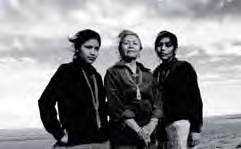
2 minute read
A Decade at a Glance
1998 –The Centre for Aboriginal Media was founded by Cynthia Lickers-Sage with partners Vtape, the Woodland Cultural Centre and founding patron Roberta Jamieson.
1998 –Chris Eyre’s Smoke Signals, starring Adam Beach and written by Sherman Alexie, is released and billed as the first feature-length dramatic film with an all-Native cast and crew.
Advertisement
1999 –Canada’ s Aboriginal Peoples’ Television Network (APTN) becomes available nationwide as the world’s first national Indigenous television network.
1999 –The awar d-winning Big Soul Productions, Canada’s first Indigenous-owned production studio, is founded by Laura Milliken and Jennifer Podemski.
2000 –The first imagineNA TIVE Film + Media Arts Festival takes place in Toronto. Blood River, directed by Kent Monkman and starring Tantoo Cardinal, Jennifer Podemski and Brandon Oakes, wins Best Film.
2000 –Shirley Cheechoo is the first Indigenous woman in Canada to write, dir ect, produce and act in a feature-length film with Bearwalker.
2000 –Jef f Bear launches Urban Rez Productions.
2001 –Atanarjuat: The Fast Runner , an Isuma production directed by Zacharias Kunuk, wins the Camera d’Or at Cannes. Atanarjuat opens the 2nd imagineNATIVE Festival, where it is introduced by Canada’s Governor General, Adrienne Clarkson.
2002 – Zacharias Kunuk is presented with the Order of Canada.
2004 –Renowned documentary filmmaker Alanis Obomsawin is presented with the Order of Canada. She is honoured with imagineNATIVE’s inaugural Milestone Award.
2004 – Taika Waititi’s short film 2 Cars, 1 Night is nominated for Academy Award after screening at imagineNATIVE.
2006 –The Jour nals of Knud Rasmussen, directed by Zacharias Kunuk and Norman Cohn of Isuma, is the first Indigenousproduced film to open the Toronto International Film Festival.
2006 –The Blossoming of Maximo Oliver os, a film by Kanakan Balintagos/Auraeus Solito of the Philippines, wins the Teddy Award at the Berlin International Film Festival after screening at imagineNATIVE.
2007 –IsumaTV is launched by Igloolik Isuma Productions, in association with Nunavut Independent TV Network (NITV), imagineNATIVE Film + Media Arts Festival, Vtape, Native Communications Society of the NWT and other non-profit agencies.
2007 –imagineNA TIVE presents Shapeshifters, Time Travelers and Storytellers, curated by Kerry Swanson and Candice Hopkins, the first original exhibit generated by the Institute of Contemporary Culture Gallery in the Royal Ontario Museum’s newly opened Michael Lee Chin Crystal. The show is named by Toronto’s NOW Magazine as one of the city’s Top Ten exhibits of the year.
2007 –T amara Podemski wins the Sundance Special Jury prize for acting for her lead performance in Sterlin Harjo’s Four Sheets to the Wind, the opening selection for the 2007 imagineNATIVE festival.
2008 –imagineNA TIVE Milestone Award-winner Alanis Obomsawin is honoured with the Governor General’s Award. imagineNATIVE presents over 100 films and total festival attendance reaches over 10,000.
2008 –Befor e Tomorrow, by the Arnait Women’s Video Collective, wins the Best Canadian First Feature Award at the Toronto International Film Festival, the first Indigenous film to do so. The film is also selected as one of TIFF’s Top Ten Canadian films of the year and is given a special presentation at imagineNATIVE.
2009 –Australian dir ector Warwick Thornton, whose numerous short films have screened at imagineNATIVE, takes home the Camera d’Or at Cannes for his first feature film, Samson and Delilah.
2009 –imagineNATIVE screens its commissioned program Culture Shock, curated by Steve Loft with short works from Bonnie Devine, Keesic Douglas, Darryl Nepinak and Bear Witness, at the Berlin International Festival.










